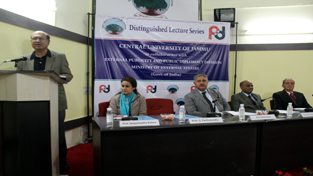Excelsior Correspondent
JAMMU, Feb 16: Central University of Jammu in collaboration with External Publicity and Public Diplomacy Division, Ministry of External Affairs, Govt of India, organized a lecture on ‘India’s Relationship with Pakistan’, here today.
G Parthasarthy, former Indian High Commissioner to Pakistan, was the chief guest and resource person. He was accompanied by Air Vice-Marshal Kapil Kak (Retd.), well known strategic analyst and Dr Mallika Joseph, Executive Director, Australia India Institute.
Mr Parthasarthy started his speech linking up the great history of Indian diplomacy and how MEA has been working throughout the post-independence era. Coming onto the subject of India and Pakistan, he highlighted the post-Kargil era, where the demarcation of LOC took place and how Musharraf and Vajpayee worked together for the betterment of the bilateral relations between the two countries. By giving reference to various factors like China, US and Afghanistan and terrorist attacks like that of Mumbai 2008 and Pathankot 2016, he tried to explain the exact situation that is prevailing at the moment. He ended his lecture by highlighting the fact that the only way the issues between both the neighbour countries can be solved is by following the same steps which were taken by the Indian Govt in between 2004-2008.
Air Vice-Marshal Kapil Kak tried to give an analytical view of the situation. He recalled how India, for the very first time, has realised the importance of Afghanistan and its interests vested there. He further added that India has made an excellent move by providing Afghanistan, military helicopters. He also added how US has been manipulating India to proxy China, where on the other hand the recent US-Pak deal to supply 8 F-16 fighter jets has shown the other negative face of the US.
Prof Ashok Aima, Vice-Chancellor, CUJ sought to explain how effective and efficient dialogue between India and Pakistan is a must for long-lasting peace.
The event was attended by members of the civil society, representatives from the Police and armed forces, academicians, research scholars and students.


